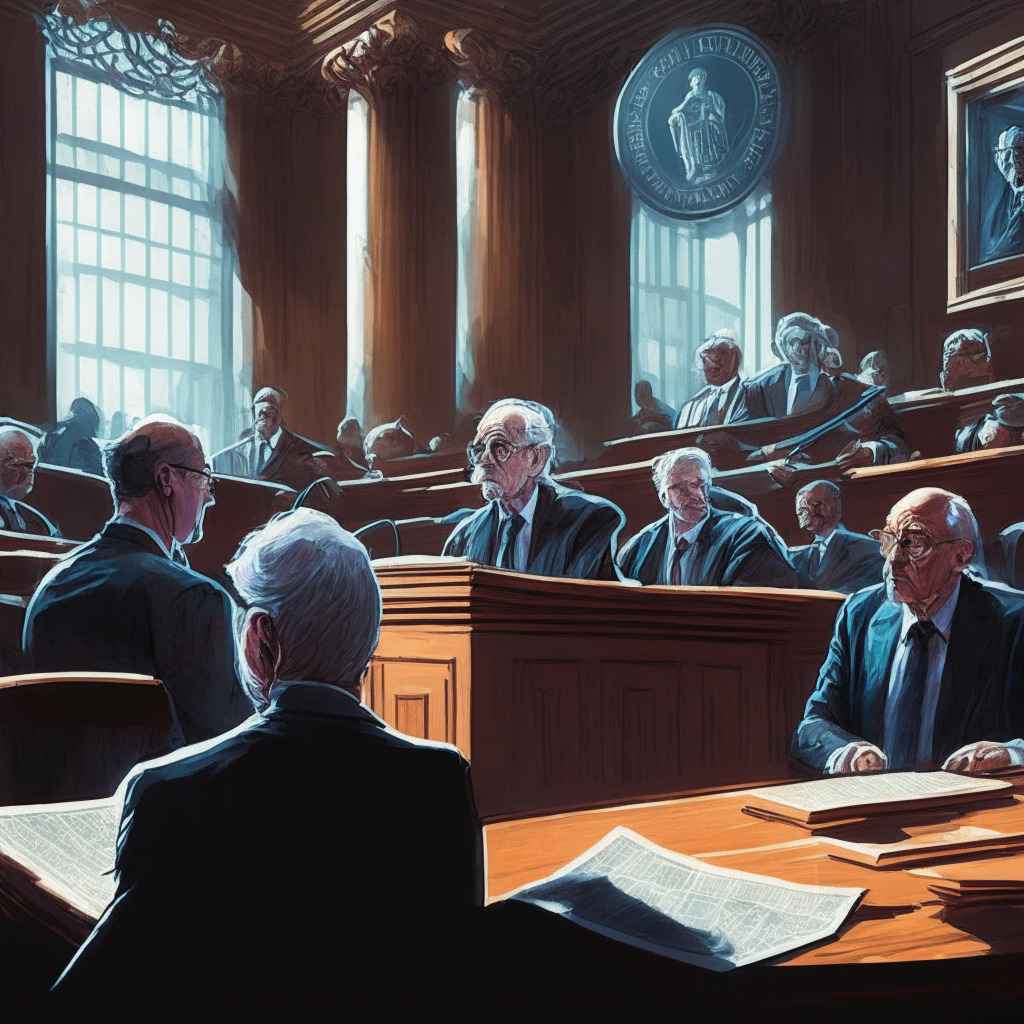The United States Securities and Exchange Commission (SEC) is employing artificial intelligence for financial surveillance, confirmed SEC Chair, Gary Gensler. This technology aids in identifying patterns of market manipulation or fraudulent activities. However, questions about privacy, potential bias, and the need for transparency in the use of such technologies by regulatory agencies persist.
Search Results for: Gary Gensler
Crypto Regulation: SEC’s Stance Under Scrutiny Amidst Regulatory Inconsistencies and Market Concerns
Gary Gensler, SEC Chair, aims to place cryptocurrencies under SEC’s regulatory oversight, citing widespread noncompliance within the crypto industry. However, recent US court decisions challenge a blanket crypto regulation, including exceptions for specific cryptocurrencies like XRP. These evolving regulatory scenarios have spurred concern about stifling innovation and driving away crypto businesses.
Balancing Act: Evaluating the Call for Limited SEC Oversight in Cryptocurrency Regulation
Congressman Tom Emmer plans to introduce an amendment to minimize SEC’s crypto oversight, highlighting overreach by chairman Gary Gensler. Emmer emphasizes the need to cease enforcing funds for digital assets until clear regulations are defined, reducing unnecessary compliance burdens and promoting innovation. However, the lack of concrete crypto regulation poses risks and challenges. Balancing regulation and protection of investors’ interests is paramount in propelling the crypto realm forward.
SEC’s Crypto Regulation Approach: A Stepping Stone or Stumbling Block?
Gary Gensler, the SEC Chairman, is facing criticism from lawmakers for his aggressive stance on crypto regulation lacking transparency. The SEC’s focus on enforcement and penalties, absent clear guidelines on crypto assets within its jurisdiction, has come under scrutiny. Furthermore, differing views on regulatory approach, particularly regarding potential links between Prometheum and Chinese entities, have led to questioning of the SEC’s approval procedures. As Gensler prepares to return to Capitol Hill, debates on cryptocurrency policy will intensify, with calls for a cohesive, clear, routine for regulating this sector.
SEC’s Cry for More Crypto Oversight: A Safety Net or A Threat to Innovation?
“SEC Chairman, Gary Gensler, seeks a significant budget increase to strengthen crypto market regulations, arguing it’s currently a ‘Wild West’ of noncompliance. This move could enhance investor safety but potentially stifle tech innovation in this emerging industry.”
US Congress Critics Challenge SEC’s Approach to Crypto Regulation
“US representatives French Hill and Dusty Johnson question SEC chairman Gary Gensler’s approach to digital asset regulation. They suggest that shaping legislation is a more potent tool for resolving regulatory issues in the digital asset space, offering firms guidance and bolstering customer protection.”
SEC Chair’s Concern Over Ripple Ruling: A Blessing or Curse for Retail Investors?
SEC chair Gary Gensler voices his disappointment over a court ruling that concluded Ripple’s XRP is not inherently a security. He believes this ruling could potentially blindside retail investors. The ruling’s ambiguity and regulatory uncertainty further fuels ongoing discussions within the crypto space about protecting investor interests.
Navigating the Ripple: SEC’s Mixed Feelings on Court’s Verdict and What it Means for Retail Investors
The SEC Chair, Gary Gensler, has mixed feelings about a recent Ripple case ruling. Despite the court’s decision that token sales are not classified as securities sales, the SEC continues the case exploration, creating an air of unpredictability for potential market entrants. Gensler defends SEC practices, highlighting their proactive rulemaking to better regulate the crypto landscape.
Artificial Intelligence: A Double-Edged Sword for The Global Financial System
SEC Chair, Gary Gensler warns against big tech’s monopolization of AI applications in financial markets, voicing concerns about potential global economic destabilization. With AI’s integration into areas like robo-advisors and stock market prediction, Gensler believes failure to regulate could exacerbate economic instability due to financial system interconnectivity.
SEC Chair’s Alleged Connection to Bankrupt FTX: Ethics Probe Sparks Transparency Debate
SEC Chair Gary Gensler is under investigation by the regulator’s ethics committee due to his alleged connection with Sam Bankman-Fried, founder of the now-bankrupt FTX Derivatives Exchange. This probe revolves around an unapproved Zoom call between them, raising concerns about transparency and fairness in the crypto market.
Binance vs SEC: Legal Battle Heats Up, Misleading Statements & Conflict of Interest Claims
Binance accuses the US SEC of misleading statements in a lawsuit and alleges a conflict of interest involving SEC Chairman Gary Gensler. This ongoing legal battle raises crucial industry concerns, potentially influencing crypto regulations and investor confidence.
Ethereum Co-founder’s Connection to Prometheum: Overzealous Scrutiny or Valid Concern?
The connection between Ethereum co-founder Vitalik Buterin and Wanxiang Blockchain Labs has re-entered the spotlight due to Prometheum, a firm partly owned by Shanghai Wanxiang Blockchain and praised by SEC Chairman Gary Gensler for regulatory compliance. This connection raises questions about the intricate relationships between crypto companies and their founders, impacting the industry’s push for regulatory acceptance.
SEC vs XRP: Crypto Classification Debate and the Implications for Blockchain’s Future
Pro-XRP lawyer John Deaton argues that the SEC cannot justify secondary XRP sales as securities, citing existing case law and the Howey Test. He questions SEC Chair Gary Gensler’s approach towards crypto regulation, raising skepticism around the current regulatory environment. The Ripple vs SEC case outcome could significantly impact the future of digital assets.
Regulation Debate: SEC’s Approach Limits Crypto Exchange Accessibility & Impedes Token Functionality
The House Financial Services Committee discussed regulation of digital asset markets, focusing on crypto market structure and stablecoin regulation. Aaron Kaplan, CEO of Prometheum, stated that existing securities laws suffice for crypto regulation, echoing SEC Chair Gary Gensler’s viewpoint. However, some argue that the SEC’s current approach doesn’t provide a clear path for crypto exchanges.
SEC’s Contradictory Stance: Impact on Ethereum, Altcoins, and Crypto Market Recovery
In 2018, SEC Chair Gary Gensler stated that Ethereum and Bitcoin are not securities. Recently, Gensler declared all cryptocurrencies except Bitcoin as securities, launching enforcement initiatives within the cryptosphere. As lawsuits develop, investors must continuously adjust their crypto portfolios and observe market trends to navigate the ever-evolving landscape.
Bitcoin Consolidation, SEC Reform Battle, & Global Crypto Shifts: Analyzing Market Effects
Bitcoin enters consolidation phase amidst rising regulatory concerns in the US, with the SEC Stabilization Act proposal aiming to restructure the SEC and dismiss Chairman Gary Gensler. The future of crypto regulation remains uncertain, affecting Bitcoin’s market direction and emphasizing the importance of staying informed on developments and opportunities.
SEC Stabilization Act: Restructuring SEC and Crypto Regulation Controversy Unfolds
Republican congressmen Warren Davidson and Tom Emmer have filed the SEC Stabilization Act, aiming to restructure the SEC and remove Chairman Gary Gensler, citing concerns over his governance of the crypto market. The legislation seeks to provide clearer and more consistent oversight for American investors and the crypto industry, amid concerns of a detrimental impact on the market and potential migration of the industry overseas.
Winklevoss Warns Democratic Crypto Stance Could Cost Youth Vote and Elections
Crypto billionaire Cameron Winklevoss warns that Senator Elizabeth Warren and SEC Chairman Gary Gensler’s pushback against crypto may alienate potential Democratic supporters, particularly Millennials and Gen Z voters. As younger generations increasingly embrace crypto’s potential applications and investments, the growing regulatory scrutiny could negatively impact their affinity towards the Democratic party.
Crypto Wars: Democrats Risk Alienating Youth Voters with Anti-Crypto Stance
Crypto billionaire Cameron Winklevoss warns that the war on cryptocurrencies led by U.S. Senator Elizabeth Warren and SEC Head Gary Gensler could alienate Millennials and Gen Z, potentially impacting Democratic voter support. Not all Democrats share anti-crypto sentiment, as the debate around regulations continues to shape the political landscape.
SEC’s Aggressive Actions on Crypto Exchanges: Impact on Regulatory Landscape and Future Prospects
SEC Chair Gary Gensler’s aggressive actions against crypto exchanges like Binance and Coinbase could have far-reaching consequences, such as prompting congressional action on crypto regulation and leading to clearer guidelines for crypto businesses. However, uncertainty remains over whether tighter or more relaxed regulation will emerge.
SEC vs Coinbase and the Battle for Crypto Regulation in the US: Moral Authority Overreach?
The SEC, led by Gary Gensler, recently filed charges against Coinbase, citing existing U.S. laws to regulate cryptocurrencies. However, ongoing bills in Congress, such as the Digital Asset Market Structure and Investor Protection Act, could undermine these actions and demonstrate Gensler’s potential overreach.
Crypto Regulations vs Industry Growth: Navigating the Compliance Tightrope
U.S. SEC Chair Gary Gensler emphasized the importance of compliance in the crypto industry amid increasing regulatory scrutiny, rejecting preferential treatment for cryptocurrencies. Adherence to securities laws is attainable for crypto platforms, making careful evaluation of potential investment crucial.
Bitcoin’s Reaction to Softening US Labor Market and SEC’s Crypto Crackdown
The cryptocurrency market saw a surge as Bitcoin rose to over $26,800, possibly due to weaker US labor market data. However, SEC Chairman Gary Gensler’s criticism of the crypto industry erased most gains. Bitcoin’s future may be influenced by evolving regulations and shifting macroeconomic factors.
SEC Chair’s Surprising Offer to Advise Binance: Implications and Conflict of Interest
In a surprising revelation, SEC Chair Gary Gensler reportedly offered to serve as an advisor to Binance back in 2019. This raises questions about potential implications for the exchange and the industry, and the importance of addressing any conflicts of interest to maintain credibility and trust.
Crypto Exchanges vs SEC: Regulation Battle Affecting Future Adoption & Innovation?
Coinbase CEO Brian Armstrong reported a tense interaction with SEC’s Gary Gensler over exchange registration, amid lawsuits against Coinbase and Binance for unregistered operations. These legal battles raise concerns about the future of crypto regulation and its impact on investor security, market stability, and technological growth within the industry.
Binance, SEC, and the Future of Crypto Custodians: Analyzing Risks and Compliance
SEC Chairman Gary Gensler expresses concerns over Binance’s custodianship of crypto assets and highlights accusations of securities law violations, market manipulation, and mismanagement of user assets. Gensler emphasizes the need for compliance with public policy regulations for crypto companies to operate safely and transparently.
Treasury Secretary vs SEC: The Battle for US Crypto Regulation Clarity
Treasury Secretary Janet Yellen supports using enforcement tools to address risks in the digital currency ecosystem and seeks additional regulation. However, her stance contrasts with SEC Chairman Gary Gensler, who believes existing financial regulations suffice. The crypto industry awaits concrete guidelines amid ongoing debates and polarization.
SEC Lawsuits Fuel Memecoin Frenzy: Profits, Pitfalls, and Long-Term Sustainability Debate
Memecoins themed around SEC chair Gary Gensler and the regulatory body have experienced significant price surges following recent lawsuits against Coinbase and Binance. Investors need caution as memecoins’ small market capitalizations and low liquidity levels lead to extreme volatility and major price swings. The long-term sustainability of such investments is uncertain.
Connecting the Dots: Crypto Lawsuits, Politics, and the Race for CBDC Dominance
John Deaton, a lawyer representing XRP token holders, suggests political motives could influence legal actions against major crypto exchanges like Binance and Coinbase. He proposes connections between Senator Elizabeth Warren, SEC Chair Gary Gensler, and a push for launching central bank digital currencies (CBDCs) as potential explanations for aggressive enforcement.
SEC Crackdown on Crypto: Protecting Consumers or Stifling Innovation?
SEC Chairman Gary Gensler claims the crypto industry’s business model is “built on non-compliance” and highlights actions taken against prominent exchanges like Coinbase and Binance. Critics argue stricter regulations could hinder innovation in the largest global economy.
Conflicting Crypto Classification: CFTC vs SEC Showdown and Its Impact on Investors
Conflicting opinions between the CFTC and SEC on cryptocurrency classification create uncertainty in digital asset regulation. SEC Chairman Gary Gensler asserts all cryptocurrencies, apart from Bitcoin, qualify as securities, while CFTC Chairman Rostin Behnam reaffirms Ethereum as a commodity. As regulatory debates continue, understanding the evolving landscape is essential for safe crypto investment.
Crypto Exchanges vs SEC: Evading Regulation & Impact on Innovation and Trust
SEC Chair Gary Gensler addressed ongoing lawsuits against Binance and Coinbase, accusing them of evading US regulation as unregistered securities exchanges. He emphasized the importance of compliance with regulations to build trust and the SEC’s actions being “pro-innovation.”































